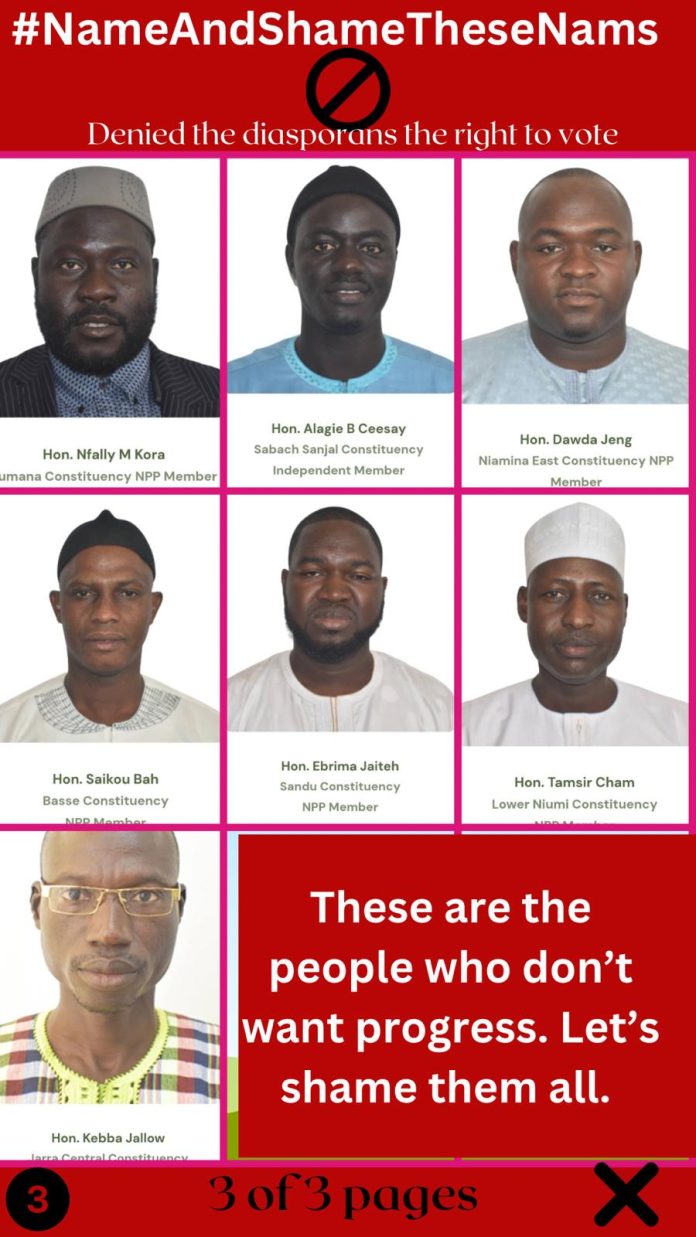Gambia Members oder Parliament who voted against Diaspora Voting Rights .Does These people know bout the constitution …….? The issue of Non-resident citizen voting in The Gambia is a cause for concern.
By professor Mballow, Social and Political analyst
Non-resident citizen voting is citizens voting in elections according to their citizenship while not residing in the country of the election.
As of 2020 a total of 141 countries grant non-residents such as emigrants or expatriates the right to non-resident citizen voting.
There is considerable variation across countries in regard to voter eligibility, voting modalities, i.e. voting in person at diplomatic missions or other physical locations, by post or online, which elections non-resident citizens may vote in, i.e. elections of the national legislature, executive elections, referendums, or sub-national elections, and how non-resident citizen voters are represented.
The number of countries enfranchising non-resident citizens accelerated significantly in the 1990s.
Variations: when the Gambia is denying their non -resident citizens their voting rights, other countries are granting their citizens to vote outside their countries.
Some countries such as France grant their expatriate citizens unlimited voting rights, identical to those of citizens living in their home country.
Other countries allow expatriate citizens to vote only for a certain number of years after leaving the country, after which they are no longer eligible to vote (e.g. 25 years for Germany, except if you can show that you are still affected by the political decisions in Germany).
Other countries reserve the right vote solely to citizens living in that country, thereby stripping expatriate citizens of their voting rights once they leave their home country such as Ireland, with extremely limited exceptions.
Postal voting package sent to an Indonesian voter in the United Kingdom for the 2019 Indonesian general election.
There is similar variation in how non-resident citizens can exercise their right to vote. Most commonly, non-resident voters have to cast their ballots at an embassy or consulate of their country.
Some countries are even more restrictive, such as East Timor which limited in-person voting to only its Australian and Portuguese missions in 2019. At the less restrictive end of the spectrum non-resident New Zealand voters may download their ballots and upload their completed ballots to the Electoral Commission’s website or mail in or fax their ballots to the New Zealand Electoral Commission or a New Zealand diplomatic mission.French non-resident citizen voters may cast ballots in elections for the European Parliament, French presidential elections, national referendums as well as elections to the National Assembly, the lower house of parliament, and elections for members of the Assembly of French Citizens Resident Abroad who in turn elect 12 members of the French Senate. New Zealand non-resident citizen voters may cast their ballots in national as well as local elections.
In Colombia non-resident citizens may vote in presidential and legislative elections, but they are excluded from regional and local elections.
Finally, some countries assimilate non-resident voters into existing constituencies for resident citizens whereas others have reserved special seats in their legislatures for non-resident citizen voters.
The United States is an example of the first alternative. United States citizens who live abroad may vote in the state where they have established voting residence, and their votes will count toward election results in that state.
Italy, on the other hand, established special seats in the Italian Senate and the Chamber of Deputies to represent non-resident citizens.
Why can’t Gambia learn from those countries that granted the voting rights to their non-resident citizens?
Causes and consequences of non-resident citizens voting
There are a number of different reasons which explain why and when states enfranchise non-resident citizens. One factor is that states seek benefits from emigrants, i.e. states hope that emigrants will be more likely to contribute to the economy of their country of origin through remittances or show loyalty in other ways if they have the right to vote in that country’s elections. This is the case in The Gambia. Therefore, denying the franchise of the Gambian living in the Diaspora is totally erroneous.
Second, the enfranchisement of non-resident citizens may be the result of lobbying by emigrant organizations. This played a role in the Mexican case.
Third, governing parties will resist non-resident citizen voting if they have grounds to believe that extending the franchise will benefit the opposition. Thus, non-resident citizen voting becomes possible once the opponents of non-resident citizen voting lose power as happened in Italy in the 1990s. This is what president Adama Barrow and his administration intend to do against the non-resident citizens.
Finally, we found evidence for the diffusion of democratic norms favoring non-resident citizen voting. Once one country introduces non-resident citizen voting, neighboring countries become more likely to do the same.


